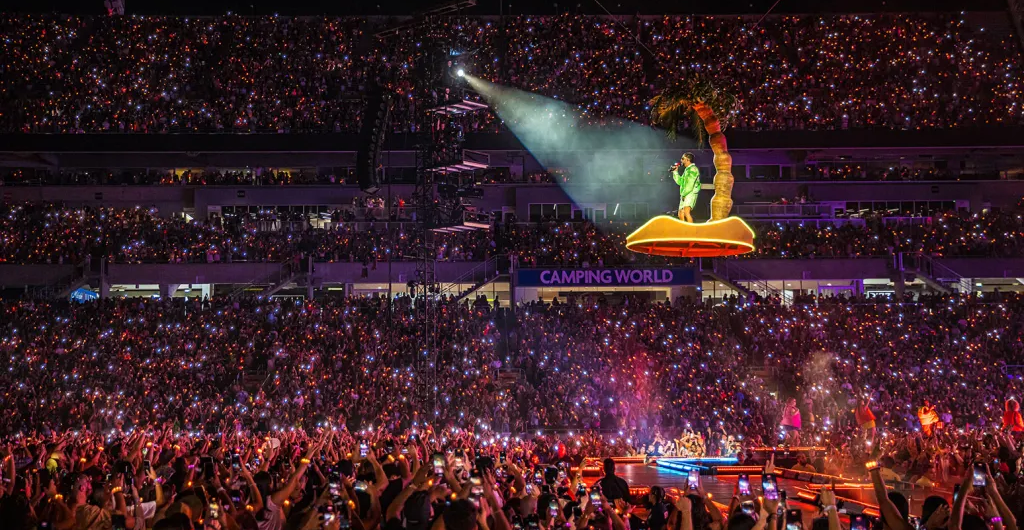Photo via Rolling Stone
***
At every party, club, or bar, at least one Bad Bunny song is bound to play. Whether you love him or hate him, there is no denying that he has taken over the music industry. Bad Bunny, born Benito Antonio Martínez Ocasio, has gone from a Puerto Rican sensation to a global cultural icon. His genre-bending reggetón and trap songs dominate charts worldwide, and he has headlined some of the largest U.S. venues, including sold-out stadium tours. His album Un Verano Sin Ti spent 13 weeks at No.1 on the Billboard 200, the longest run ever for an all-Spanish-language album. According to Pollstar, his 2022 “World’s Hottest Tour” became the highest-grossing tour ever by a Latin artist, pulling in over $435 million worldwide.

Bad Bunny performing a sold-out show in Orlando, Florida, during his “World’s Hottest Tour.” Photo via BillBoard
***
Naturally, the announcement of his new “Debí Tirar Más Fotos World Tour” sparked global anticipation. Fans worldwide were on the edge of their seats, refreshing their social media feeds and ticketing sites. They eagerly waited for the date announcements, hoping their city made the cut. So, when the dates were announced this fall, the absence of U.S. locations immediately drew attention and disappointed millions. After all, this is supposed to be a world tour, and the United States has the world’s third-largest population. Many, myself included, questioned why he would deliberately avoid America: Does he hate American fans? Is our concert etiquette really that horrible?

Image via Pollstar
***
In an interview with I-D, Bad Bunny explained his choice bluntly: “But there was the issue of—like, fucking ICE could be outside [my concert]. And it’s something that we were talking about and very concerned about.”
His concern is not unfounded. It isn’t about routing logistics, but about human rights. In recent months, ICE has been criticized for conducting aggressive enforcement operations in workplaces, neighborhoods, and even public gatherings, leaving many feeling unsafe in their own communities. While official policy limits raids at “sensitive locations” such as schools or churches, concerts do not carry the same protections. Even then, ICE still targets these sensitive locations, with instances of ICE agents waiting around the corner, ready to deport or investigate anyone deemed suspicious. The fear that a beloved artist’s concert could become a trap is not irrational for immigrant communities already wary of visibility.
Bad Bunny’s refusal to tour in the U.S. highlights the power of perception. Even if ICE has not publicly targeted music events before, the climate of fear surrounding immigration enforcement is strong enough to alter cultural and commercial decisions. In this case, it shapes whether fans feel safe attending shows and whether artists feel comfortable performing. What should be a celebration of music now becomes a reminder of surveillance and insecurity. When one of the world’s most prominent artists feels compelled to avoid America over immigration enforcement, it raises a chilling question: How free is cultural expression in a country where attending a concert could put thousands of families at risk?
Concerts often strengthen cultural identity and provide a sense of community unlike any other. For an artist of Bad Bunny’s stature, forgoing an entire country means fewer opportunities for fans—mainly immigrant fans—to celebrate shared culture in public spaces, which is truly disheartening. In a society where a feeling of belonging can already be a struggle, the inability to enjoy the simple joy of live music only alienates and divides the country further.
Moreover, the choice to bypass the U.S. carries significant economic consequences. The United States remains the largest live music market in the world, with touring revenues that exceed other countries by a landslide. Bad Bunny isn’t just an artist; he is a global industry. During his most recent tour, he grossed about $208 million and sold approximately 700,000 tickets in the U.S. alone. Skipping the United States means leaving millions of dollars on the table, not only for the artist but also for local economies. From the venue itself to hotels, restaurants, transportation, and tourism, live music events fuel an entire ecosystem.
Yet, his decision also reflects a shifting dynamic in the music industry. His popularity in Latin America, Europe, and beyond is strong enough that he does not rely exclusively on U.S. touring revenue. His recent Puerto Rico residency ensures that the U.S. based fans, especially Puerto Ricans and those in the diaspora, can still see him perform without facing the same risks. As he told I-D, “People from the US could come here to see the show. Latinos and Puerto Ricans of the United States could also travel here, or to any part of the world.” In this way, he transforms Puerto Rico into a cultural hub—a place that is politically tied to the United States but socially distinct, offering a safer alternative for his community.
Regardless, this absence speaks to the paradox facing American immigration policy. On one hand, the Latin music market is booming; U.S. revenues for Latin music reached an all-time peak of $1.4 billion in 2023. On the other hand, the very communities driving this cultural and economic surge remain disproportionately vulnerable to enforcement. His refusal to tour in America acts as a stand for human rights and as an economic boycott.
Leaving the U.S. off his tour sends a clear message: safety and solidarity with his community matter more than profit. This choice aligns with his history of political advocacy. He has consistently used his platform to speak on social issues such as immigration, gender violence in Puerto Rico, and systemic inequality, framing his art as a vehicle for representation.

Bad Bunny publicly denounces ICE via an Instagram story. Video via X
***
I view Bad Bunny’s decision as bittersweet. It shows his care for fans’ safety and reinforces that U.S. immigration policies can have ripple effects far beyond their intended purpose. These policies shape the spaces where immigrant communities can gather, celebrate, and experience culture without fear. His boycott sparks discourse about the direction of our society— a conversation that needs to happen, especially in these divisive times. Whether fans see his decision as protective or disappointing, it is undeniably significant. In an era where his music plays at every party, bar, and club, Bad Bunny has shown that sometimes silence speaks the loudest.
***
This article was edited by Mary Elaina Gibson and Daniel Ukandu.
